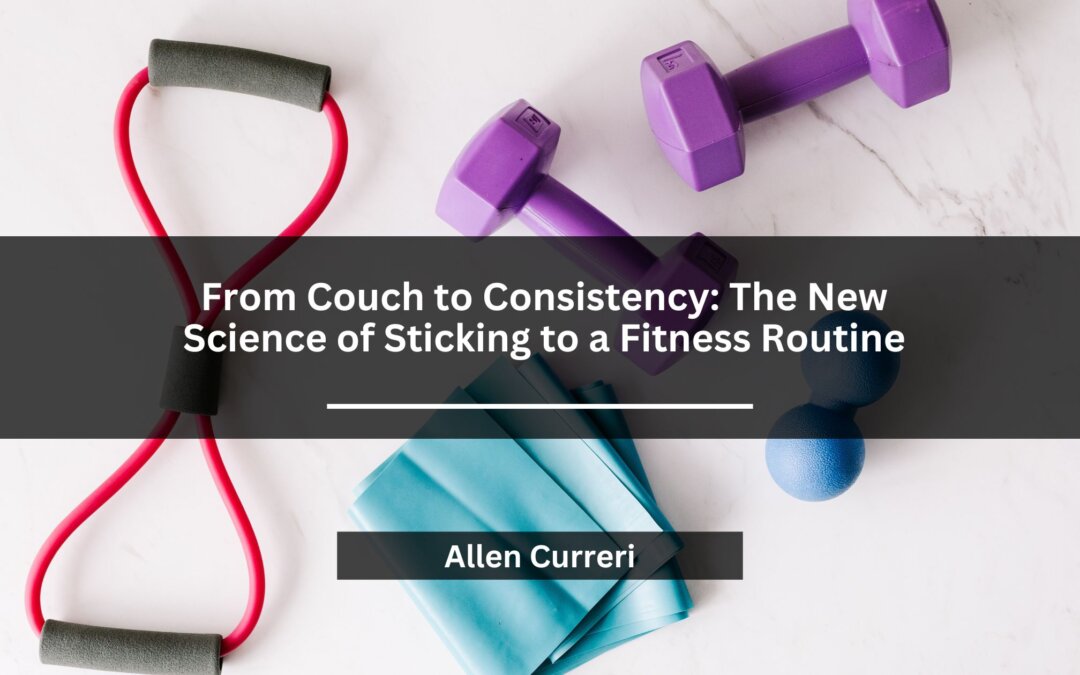
Beyond the Gym: The New Science of Health and Fitness
Health and fitness have evolved far beyond pumping iron or logging miles on a treadmill. Today, the focus has shifted to a holistic view that blends exercise, nutrition, recovery, and mental well-being—powered by technology and cutting-edge research. Let’s explore how fitness is changing in 2025 and what that means for individuals striving for healthier, longer lives.
Personalization is the New Norm
Gone are the days of one-size-fits-all workouts. With the rise of wearable tech and AI-driven apps, fitness is increasingly personalized:
- Smart wearables track everything from heart rate variability to sleep cycles, offering real-time insights.
- AI fitness coaches recommend workouts tailored to energy levels and recovery.
- DNA-based nutrition plans suggest diets aligned with genetic predispositions.
This personalization helps individuals optimize results while reducing injury risks.
Functional Fitness Takes Center Stage
The trend now is toward functional fitness—training that enhances everyday movements. Exercises like kettlebell swings, bodyweight circuits, and resistance band workouts improve mobility, stability, and balance. This shift reflects a broader focus on longevity and quality of life, not just aesthetics.
Seniors are embracing functional training to maintain independence, while athletes use it to enhance performance and reduce downtime from injuries.
The Rise of Recovery Science
Rest is no longer seen as downtime—it’s part of the training cycle. Advances in recovery science emphasize:
- Sleep optimization as the cornerstone of performance.
- Cold plunges, saunas, and compression therapy to reduce inflammation.
- Mindfulness and breathwork to manage stress, which impacts everything from muscle repair to immunity.
Elite athletes and weekend warriors alike are adopting these methods to sustain long-term fitness gains.
Nutrition Gets Smarter
Nutritional strategies are evolving with better data:
- Continuous glucose monitors (CGMs) allow individuals to see how their bodies respond to different foods in real time.
- Plant-based proteins and lab-grown alternatives support both performance and sustainability.
- Hydration science has advanced, focusing on electrolyte balance and individualized fluid needs.
Food is no longer just fuel—it’s a measurable performance variable.
Mental Fitness as a Core Pillar
The fitness industry is finally acknowledging that mental health and physical health are inseparable. Programs now integrate meditation, journaling, and even virtual reality therapy sessions to reduce stress and improve focus.
This integrated approach makes health less about chasing numbers and more about cultivating resilience.
Looking Ahead
As we look to the future, expect health and fitness to become even more data-driven, holistic, and individualized. The line between healthcare and fitness will continue to blur, with preventive strategies reducing reliance on treatment.
Final Thoughts
Health and fitness are no longer confined to gyms or fad diets. They’re about living smarter, stronger, and longer through a balance of physical training, nutrition, recovery, and mental wellness. With science and technology leading the way, the future of fitness promises not just healthier bodies, but healthier lives.

From Couch to Consistency: The New Science of Sticking to a Fitness Routine
We all know the drill — New Year’s rolls around, we sign up for a gym membership, maybe even buy a smartwatch. But by March, our motivation vanishes. So why is it so hard to stay consistent with fitness, even when we know it’s good for us?
The truth is, sticking to a health and fitness routine isn’t just about willpower. It’s about psychology, physiology, and — most importantly — structure.
Let’s start with the brain. When you exercise, your body releases endorphins and dopamine — chemicals that boost mood and reduce stress. But the real magic happens when exercise becomes a habit. That’s when the brain starts associating movement with reward. The trick is making it to that habit-forming phase — typically around 60 to 90 days.
One proven strategy? Start small and specific. Instead of aiming to “get fit,” commit to a 20-minute walk every day after lunch. Instead of signing up for a CrossFit class five days a week, try two and build up. Behavioral science shows that micro-habits lead to macro-results.
Technology also plays a major role. Fitness apps like Strava, Fitbit, and MyFitnessPal turn exercise into a game — tracking progress, setting goals, and offering social encouragement. Smartwatches now monitor everything from heart rate zones to sleep patterns, helping people optimize recovery and performance.
But perhaps the most overlooked element of fitness success is recovery. Overtraining leads to burnout and injuries. Prioritizing sleep, hydration, and mobility work is just as important as reps and cardio. Fitness is a cycle — stress the body, allow it to rebuild, repeat.
Nutrition, too, is foundational. Fueling your body with the right mix of protein, fats, and complex carbs can make or break performance and recovery. And while diets come and go, sustainable eating habits always win in the long term.
Another key factor? Community. Whether it’s a gym buddy, a virtual fitness group, or a local class, social accountability is one of the strongest predictors of long-term adherence. We’re wired to thrive in groups, and fitness is no exception.
Ultimately, the shift in the fitness world is clear — it’s no longer about “getting shredded fast” or punishing your body. The new science of fitness is about longevity, consistency, and mental well-being.
So, if you’re looking to break the cycle of stop-start routines, forget the all-or-nothing mindset. Start where you are. Move a little more today than yesterday. And above all — keep showing up.

More Than Muscles: The Science-Backed Secret to Lifelong Health
Health and fitness isn’t just about looking good—it’s about feeling alive. In an age of burnout, sedentary jobs, and endless screen time, investing in your health is the most radical act of self-care.
Movement is Medicine
You don’t need to be a gym junkie to be fit. Even 30 minutes of moderate exercise five times a week has been shown to reduce the risk of heart disease, diabetes, and even certain cancers. Regular movement boosts endorphins, improves sleep quality, and sharpens mental focus.
Whether it’s walking, dancing, lifting weights, or yoga—the key is consistency over intensity. Find what you enjoy and stick with it.
Nutrition: Your Internal Power Source
What you eat plays a huge role in how you feel. Whole foods like leafy greens, lean proteins, nuts, and fruits aren’t just good for your body—they fuel your brain and regulate your mood.
Pro tip: Focus on balance, not restriction. A colorful plate usually means a nutrient-dense meal. Hydration is just as important—aim for at least 2 liters of water a day to support digestion and energy levels.
The Sleep-Fitness Connection
Think of sleep as your body’s natural reset button. Without 7-9 hours of quality sleep, even the best workouts and diets won’t deliver results. Deep sleep is where muscle repair, fat loss, and memory consolidation occur.
Build a bedtime routine. Avoid screens an hour before bed, keep your room cool and dark, and wind down with calming activities like reading or meditation.
Mental Health is Part of the Plan
Physical health and mental health are deeply intertwined. Exercise reduces stress hormones and increases serotonin, a natural mood booster. Activities like yoga and breathwork also calm the nervous system and reduce anxiety.
Don’t underestimate the power of community. Whether it’s a fitness class, a walking group, or a gym buddy, surrounding yourself with like-minded people makes the journey more enjoyable.
Final Thoughts
Health and fitness aren’t short-term goals—they’re lifelong commitments. There’s no “perfect” routine or body type. What matters is building habits that support your well-being for the long haul.
Start small, stay curious, and remember: the best investment you’ll ever make is in you.
About Allen Curreri
Dr. Allen Curreri lives in Mason, Ohio. He is a clinical research expert with decades of professional experience. He is a talented professional with versatile experience, but foremost, he is a community member.
Allen Curreri has been working as the Principal Investigator and Senior Medical Writer at a clinical research group. He joined the company in 2017.
He is responsible for writing and collaborating on various medical device and pharmaceutical writing projects, such as CTDs, protocol amendments, and briefing documents. He enjoys his role mentoring and managing junior medical writers.
Responsible for reviewing the clinical data of new medical devices and therapeutic drugs, he then prepares documents for submission to the FDA. His expertise in various therapeutic areas, such as oncology, orthopedics, and cardiovascular, makes him an ideal fit for his position.
Besides his commitment to his important work, Allen considers it a personal responsibility and a privilege to serve his community in every way possible. Plus, Allen knows how to have fun getting his hands dirty for a good cause! As a family man, he is particularly drawn to the work of United Way, where he has been a loyal volunteer for over fifteen years and counting. With United Way, Allen focuses on creating self-sustaining progress and strong communities. The mission? Filling the most vital gaps and providing for the most fundamental unmet needs: health, income, and education.
A long-time running and marathon enthusiast, you can often find Allen on the paths and tracks around his home, training for his next challenge. Nothing is more satisfying than taking care of yourself while working for others. Allen Curreri believes in getting out on the streets and running for a good cause in fundraisers and charity marathons.

Career Background
In 2017, Allen Curreri’s presentation was selected for presentation at the 2017 Annual Conference by the Academy of Management (AOM) – his topic was Mindfulness, Information Technology Use, and Physicians’ Performance in Emergency Rooms. Allen also maintains professional membership with multiple organizations, including the Medical Affairs Professional Society, the Regulatory Affairs Professional Society, the Society of Clinical Research Associates, and the Clinical Research Society, as well as the American Medical Writers Association and the Association of Clinical Research Professionals.
As a Clinical Research Expert, Allen Curreri has established expertise in multiple areas; these areas of skill include complex data analytics, literature review, clinical research management, clinical trial management, writing project management, regulatory affairs, regulatory writing, and medical writing. He holds his Ph.D. from Case Western Reserve University, his MBA from Georgia Southern University, and his Bachelor’s Degree from Dalton State College.
